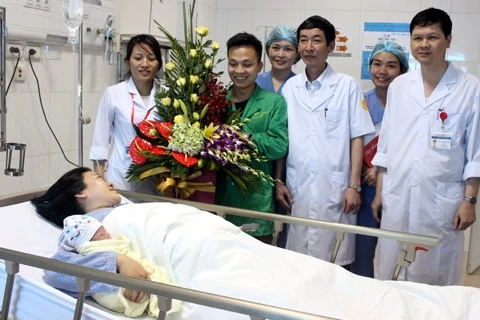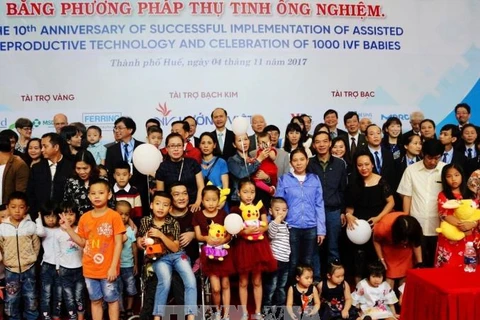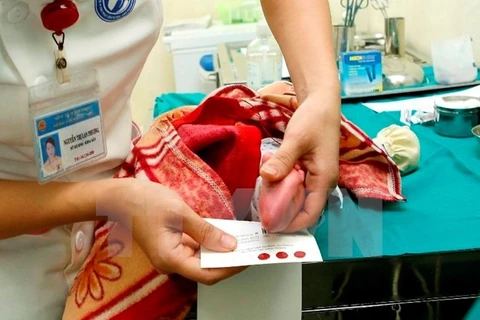HCM City (VNS/VNA) – For four years, Le Thi Binh and her husband tried to have a baby. But it was not until the couple received free in vitro fertilisation (IVF) from a charity programme based in HCM City that their dream became a reality.
“No words can express what I felt at the time when doctors said that I was pregnant,” Binh said.
The charity Uom Mam Hanh Phuc (Nurturing Happiness) at My Duc Hospital in HCM City provided the free IVF treatment to the couple, who were too poor to pay for it.
“After one year of marriage, we visited an obstetrics hospital and another specialising in men’s health in HCM City. We were told that my husband’s health was the problem,” Bình said. “So we returned to our hometown and drank herbs since that was cheap. But, after one year, then two, and then three, we still had no child.”
One day, Bình read about the Uom Mam Hanh Phuc programme via social media and applied for it immediately.
“I was lucky. The programme’s staff called and congratulated me for being chosen. That was in early 2016. I got pregnant in the first IVF cycle. Now, our child is 28 months old,” she said.
Binh and her husband are one of 86 couples who have participated in the charity programme since 2014, when it was founded. Each year, the charity chooses about 30 couples to take part in the programme.
Dr Nguyen Khanh Linh of My Duc Hospital said the number of couples in the programme’s 2018-2019 season had increased to 44.
“We feel joy whenever my colleagues and I see success and the couples get pregnant and a baby is born. This encourages us to continue the programme,” Linh said.
“I examine many patients who have financial difficulties and can only afford one or two IVF cycles. If these fail, they cannot continue the procedure because they can’t pay for it,” she added.
One couple, for example, had tried two unsuccessful IVF cycles, but were forced to stop because of lack of money. Linh called the wife, and the couple were chosen for the programme after providing an application. They now have a child.
Thus far, the programme has received 621 applicants in Vietnam, but only 167 of them have been chosen because of the charity’s limited funds.
Most of the funds are donated by My Duc Hospital’s staff and doctors, and several wealthy couples who have benefited from IVF at the hospital have also donated funds, with the hope of helping others who are less fortunate.
Dr Nguyen Thi Ngoc Phuong, known as the “godmother of infertile couples” in the country and the first person in Vietnam to offer a fertility treatment in which embryos were introduced directly into the uterus, is Chairwoman of the HCM City Reproductive Endocrinology and Infertility Association.
She noted that many people in the country were still poor, “so the cost for IVF, which is actually lower than in many other countries, is higher than their income.”
Financial assistance is especially needed because of family pressure and discriminatory attitudes.
“I’ve worked as an obstetrician and gynaecologist for a long time. I’ve met couples who could not give birth. Of these, the women suffered a lot. They were blamed for the infertility. In these cases, the husband’s family often encouraged him to divorce his wife.
“I always to say to the programme’s doctors that they should do their best and do not let these couples feel self-pity because they don’t have enough money for IVF,” Phuong said.
In other countries such as France, health insurance covers the costs for three IVF cycles, but Vietnam’s health insurance fund does not cover the costs.
Linh said the fund should cover part of the costs and regulate the proportion of coverage for IVF treatment.
Other charity programmes to assist poor infertile couples are also being provided at other hospitals in the country.
After more than 20 years of development, IVF treatment in Vietnam is well known among many patients and doctors in other countries for its success rate of nearly 50 percent and its comparably lower costs.
More and more couples from the US, France and other countries as well as overseas Vietnamese are coming to Vietnam for IVF treatment.
Foreign doctors also visit the country to learn IVF techniques from their Vietnamese counterparts who perform the world’s most advanced techniques. And IVF centres in other countries often invite Vietnamese physicians to work and teach at their centres and hospitals.-VNS/VNA
“No words can express what I felt at the time when doctors said that I was pregnant,” Binh said.
The charity Uom Mam Hanh Phuc (Nurturing Happiness) at My Duc Hospital in HCM City provided the free IVF treatment to the couple, who were too poor to pay for it.
“After one year of marriage, we visited an obstetrics hospital and another specialising in men’s health in HCM City. We were told that my husband’s health was the problem,” Bình said. “So we returned to our hometown and drank herbs since that was cheap. But, after one year, then two, and then three, we still had no child.”
One day, Bình read about the Uom Mam Hanh Phuc programme via social media and applied for it immediately.
“I was lucky. The programme’s staff called and congratulated me for being chosen. That was in early 2016. I got pregnant in the first IVF cycle. Now, our child is 28 months old,” she said.
Binh and her husband are one of 86 couples who have participated in the charity programme since 2014, when it was founded. Each year, the charity chooses about 30 couples to take part in the programme.
Dr Nguyen Khanh Linh of My Duc Hospital said the number of couples in the programme’s 2018-2019 season had increased to 44.
“We feel joy whenever my colleagues and I see success and the couples get pregnant and a baby is born. This encourages us to continue the programme,” Linh said.
“I examine many patients who have financial difficulties and can only afford one or two IVF cycles. If these fail, they cannot continue the procedure because they can’t pay for it,” she added.
One couple, for example, had tried two unsuccessful IVF cycles, but were forced to stop because of lack of money. Linh called the wife, and the couple were chosen for the programme after providing an application. They now have a child.
Thus far, the programme has received 621 applicants in Vietnam, but only 167 of them have been chosen because of the charity’s limited funds.
Most of the funds are donated by My Duc Hospital’s staff and doctors, and several wealthy couples who have benefited from IVF at the hospital have also donated funds, with the hope of helping others who are less fortunate.
Dr Nguyen Thi Ngoc Phuong, known as the “godmother of infertile couples” in the country and the first person in Vietnam to offer a fertility treatment in which embryos were introduced directly into the uterus, is Chairwoman of the HCM City Reproductive Endocrinology and Infertility Association.
She noted that many people in the country were still poor, “so the cost for IVF, which is actually lower than in many other countries, is higher than their income.”
Financial assistance is especially needed because of family pressure and discriminatory attitudes.
“I’ve worked as an obstetrician and gynaecologist for a long time. I’ve met couples who could not give birth. Of these, the women suffered a lot. They were blamed for the infertility. In these cases, the husband’s family often encouraged him to divorce his wife.
“I always to say to the programme’s doctors that they should do their best and do not let these couples feel self-pity because they don’t have enough money for IVF,” Phuong said.
In other countries such as France, health insurance covers the costs for three IVF cycles, but Vietnam’s health insurance fund does not cover the costs.
Linh said the fund should cover part of the costs and regulate the proportion of coverage for IVF treatment.
Other charity programmes to assist poor infertile couples are also being provided at other hospitals in the country.
After more than 20 years of development, IVF treatment in Vietnam is well known among many patients and doctors in other countries for its success rate of nearly 50 percent and its comparably lower costs.
More and more couples from the US, France and other countries as well as overseas Vietnamese are coming to Vietnam for IVF treatment.
Foreign doctors also visit the country to learn IVF techniques from their Vietnamese counterparts who perform the world’s most advanced techniques. And IVF centres in other countries often invite Vietnamese physicians to work and teach at their centres and hospitals.-VNS/VNA
VNA
























